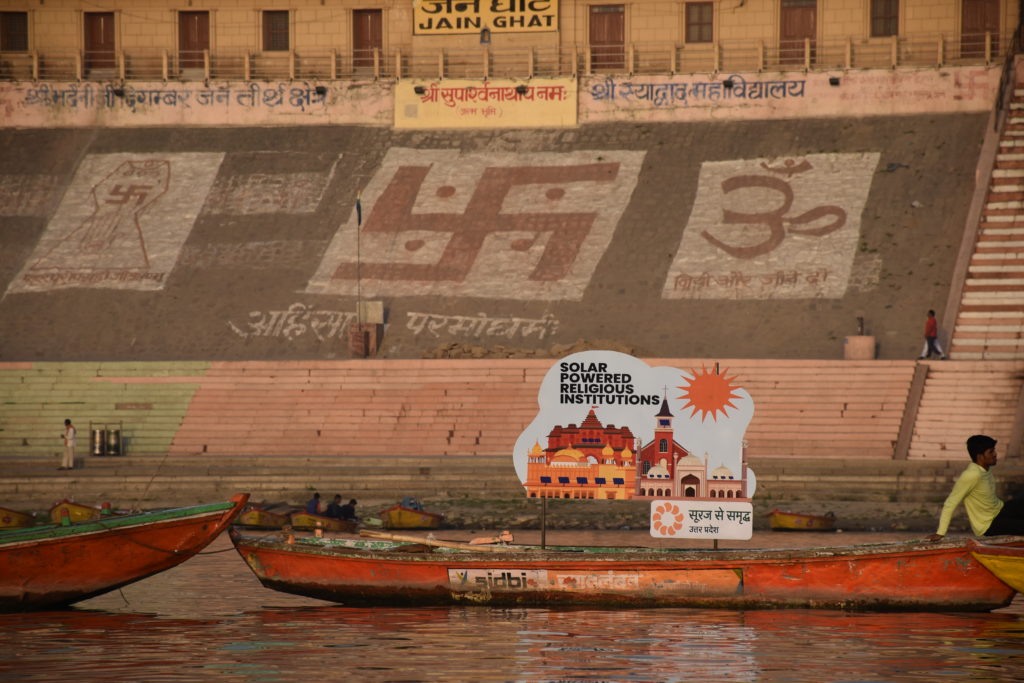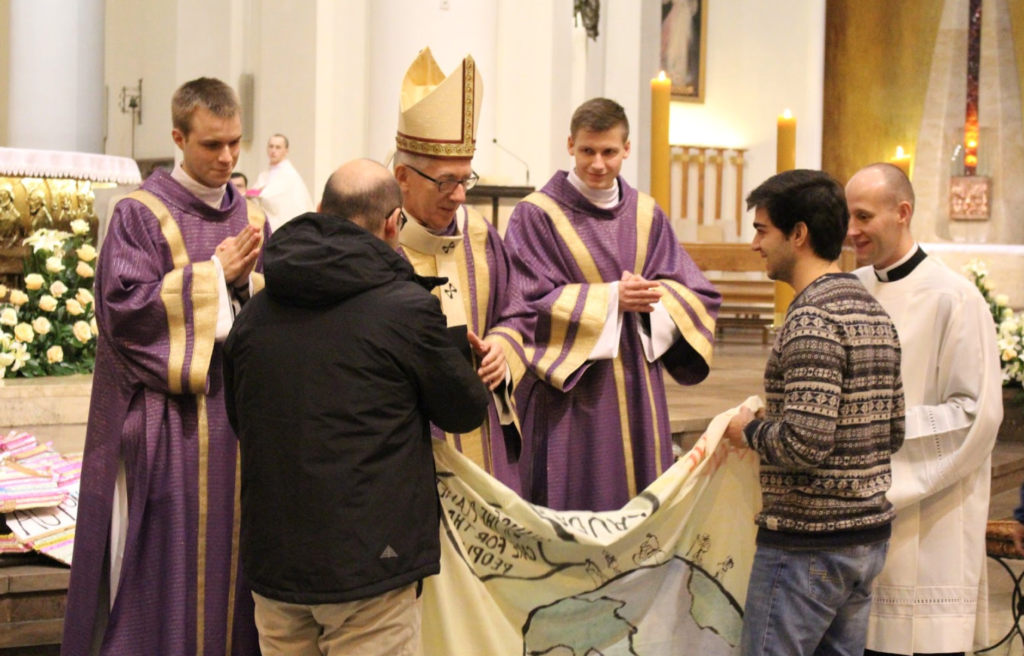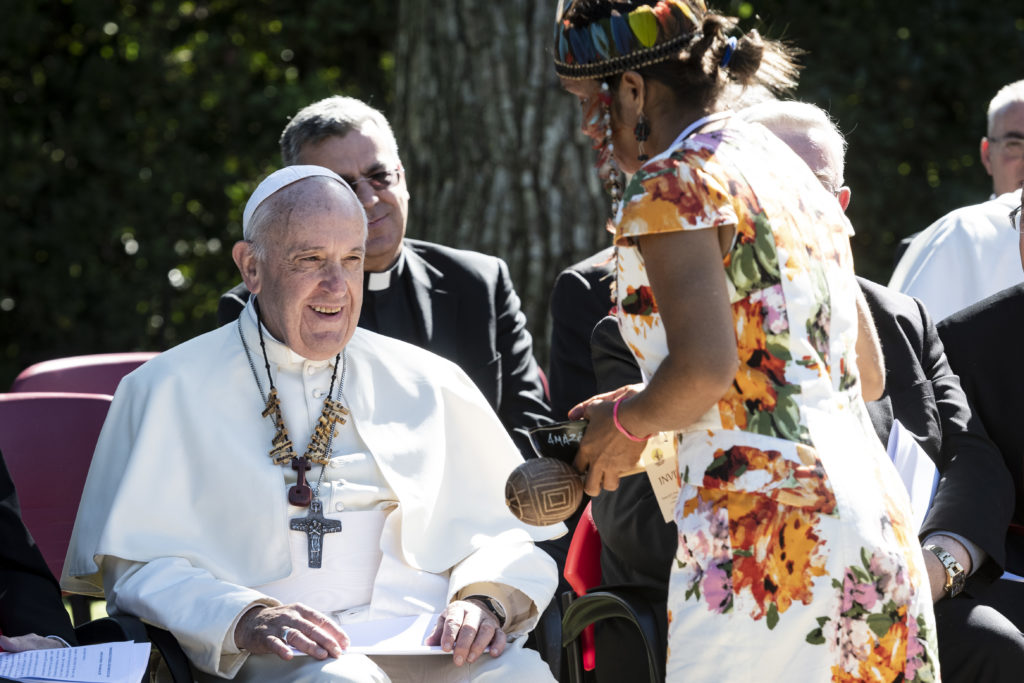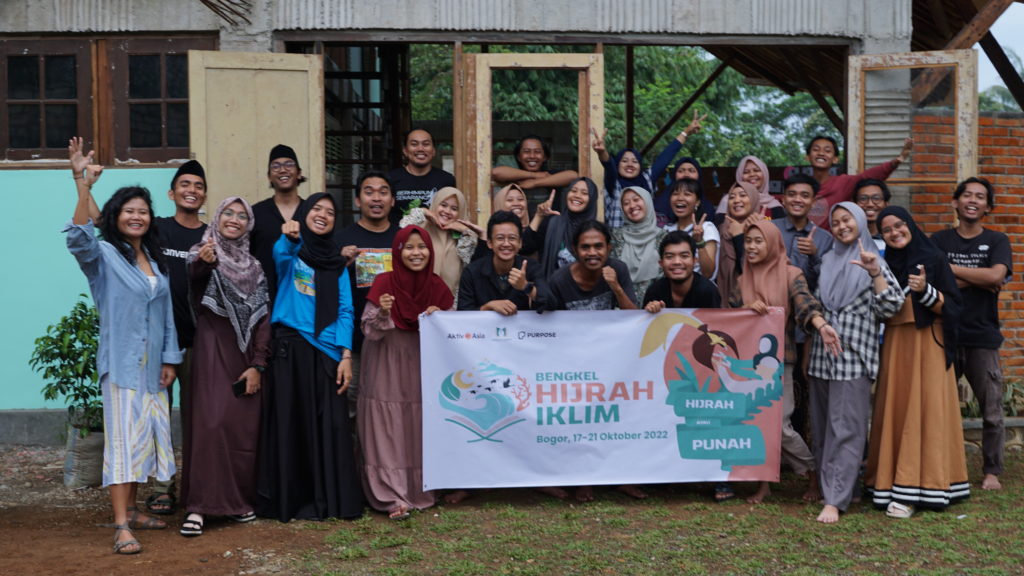Faith Communities & Climate Action: Lessons from Our Work Around the World
November 16, 2022
It’s hard to overstate the success of the climate movement. Most countries have now made pledges to get to net zero. But delivering those promises takes political capital. While the climate movement has been successful by engaging a relatively small number of people, to reach our ambitions we’re going to need to engage far more people – people who have traditionally been left out.
Purpose’s strongest climate work has often included finding new audiences which are usually unengaged or untapped by the wider climate movement. Over the last few years, we have developed highly innovative work with faith groups to drive local and national climate action. With deep spiritualities of environmental protection to draw from, feted by politicians on the right, and embedded in local communities, the political power of these groups is hard to overstate.
This blog explores our faith work and how it has evolved and deepened across a range of geographies. Read more about our insights from our regional campaigners!

India: Faith leaders – from supporters to shifters
Faith is deeply personal – usually an identity marker, part of the tradition, sometimes symbolic, or even the root of contention. In India, it is as personal as it is political. According to pre-Covid research on faith in India by Pew, the vast majority of Indians (97%) say that religion is very important in their lives and identity.
Indians associate being “truly Indian” with respecting all religions, and respecting other religions is an important part of what it means to be a member of their own religious community (80%). The research also reveals that religious tolerance is juxtaposed with segregation and national identity as nearly two-thirds of Hindus (64%) say it is very important to be Hindu to be truly Indian.
So faith spills into support for certain political parties. It has been used as a powerful mobilisation tool by political campaigners and strategists. Indian climate campaigners are increasingly recognizing, utilizing, and mobilizing faith communities for climate action as they recognize that these communities are key to influencing climate narratives and promoting climate solutions at the individual, community, and policy levels. Purpose in India has been pioneering and testing this faith-based approach – primarily in North India.
Read more on faith campaigning in India…
UP: a state of faith
Uttar Pradesh (UP) is not only India’s most populous state but is also its most politically influential one. The state sets the national political agenda by its sheer representation in the Indian Parliament. So for progress on climate nationally, the state’s decision-makers must be on board first.
UP is distinct because of its deep faith that has shaped and influenced its values, culture and arts, architecture – and politics. It is no surprise that faith communities are a key audience for Purpose’s work in UP. This engagement has evolved with a strong focus on the role of faith leaders in the climate movement.
For the most part, our work with faith leaders in UP has helped many of them move from participation towards proactive commitment on climate issues. Like most traditional climate campaigns, engagement with faith leaders began by seeing them as supporters of climate activities and amplifiers of climate messages. In both senses, their role was quite limited, without tapping into their real potential of shifting power. But this was crucial to lay the groundwork for sensitizing faith leaders about climate in the state and creating a dialogue. Then came the challenging part: moving them further towards commitment and proactiveness.
The Covid pandemic and ensuing national lockdown across India paved the way for faith leaders to recognize the extent of the climate crisis in the state. Blue skies and clean air showed nature at rest. It was also an opportunity to work with faith leaders and their followers on climate.
Our work reimagined faith leaders as actively influencing and creating climate messages for their followers, taking on a new role as influencers (access our full case study here). The campaign reached over 10 million people. Our more recent ‘Prosperity Through the Sun’ campaign tested the role of faith leaders as narrative shapers and perception shifters. Our long-term vision is to develop them into new, authentic climate actors who redistribute power.

Poland: Catholic communities act on climate
The European Union has a clear climate agenda, with goals for reducing emissions by 2030 and achieving net zero by 2050. But a group of countries consistently blocks progress – Poland is one.
We know we need action now, not in 30 years. So we need to engage not only progressive movements, but everyone in order to make the changes we need.
Faith communities and faith leaders in Poland – especially Catholic ones – play an important role in uniting communities and making sure no one is left behind.
Poland is an overwhelmingly Catholic country. Despite accelerating secularization and a drop in the number of people who actively attend Mass, it’s still the dominant religion and many people live according to its values. The Church plays an important role in public and political life – the ruling majority in Poland consistently roots itself in Catholic traditions and their political agenda reflects statements made by the Church and conservative voters.
The role of the Church is changing. And we see trust in institutions dropping. But still many people live in line with Catholic values and teachings including supporting each other, taking care of the community and family, and compassion.
A key strand of Catholic thought is caring for and protecting the environment (‘Creation’). Pope Francis in his encyclical letter Laudato Si’ urges Catholics to take immediate action on climate and justice in order to protect future generations. This opens space for campaigning to bring Catholics closer to climate.
Campaigns that resonate
Experience from Poland showed us that it is important to focus faith campaigns on some key principles, name three to start with:
- Rooting in values
- Building a narrative using the right language
- Engaging the right messengers
Read more on faith campaigning in Poland…
Climate can easily be rooted in Catholic thinking but it’s not the main narrative in Poland. Building a link between the values which exist in Catholics’ daily lives and traditions and climate is a powerful way to move the conversation forward.
Language makes a big difference to our campaigns. A mix of the Laudato Si’ encyclical when directed to grasstops leadership or, when engaging grassroots, something more simplified, drawing from everyday experiences, the legacy of Pope John Paul II and people’s hopes, fears, and challenges relevant to their community.
Our experience from the various campaigns we have run in Poland shows that frequent polling and message testing can bring important insights which can then lead to powerful tactics and activations designed for the audience we want to engage.
Finally, engaging the right messenger helps us reach out to new audiences and multiply the narrative. It’s nothing new to most campaigners – influencers and messengers are an important part of the campaign puzzle – but when working with faith communities, it really makes a difference.
There is huge value in Catholics in Poland being engaged in the conversation around the climate crisis. We see more pressing issues and we need brave people who will stand up to protect people in need, people affected by climate change but also those who are most vulnerable. Energy poverty and just transition are the topics where we really need more engagement.

Brazil: The power of Christian communities on climate
Who would have thought that a call from Pope Francis would bring such transformation to our work on the climate agenda in Brazil? That’s right! It was in 2018 when the Amazon Synod, an event of the Catholic Church, took place to discuss the future of its action in the Amazon territory with a focus on environmental protection and also on the native populations that live there.
We interviewed Catholics in Brazil ( 50% of the nation) about what they think about the environmental-political aspirations of the then-newly elected president, Jair Bolsonaro. The numbers showed 68% believed it was very important to protect the Amazon for the economic growth of the country and 85% agreed that the Amazon is key to reducing the effects of global warming.
With these results in hand, we understood the need to dialogue with the Catholic community based on something even more tangible: another proposal coming from Pope Francis called Francesco’s Economy.
Read more on faith campaigning in Brazil…
Francesco’s Economy
Francesco’s Economy invites us to humanize the economy of tomorrow. For us, the objective is to redefine the function of the Brazilian economy. It kickstarts a dialogue with Catholics with two basic questions:
1. What if we reimagine our world through an economy of solidarity and consider climate justice and the production of knowledge of traditional communities?
2. What if other solutions exist that can generate employment, income, and end hunger while also transforming our country into a production powerhouse, and at the same time protect the environment?
It was based on these questions that we started to develop our work at Our Common Home, in partnership with Catholic organizations such as GCCM, Caritas, REPAM, CPT, with grassroots ecclesial communities and community leaders.
The work encouraged dialogue on government policies, engaged Catholic communities by training their organizations to create mobilization campaigns, pressured Congress, and raised the voice of religious leaders in the press in order to question the environmental abuses of the Bolsonaro government and its allies.
We translated these complex issues by linking them to the Economy of Francisco and its themes that talk, for example, about energy transition, agriculture, or the role of women in the economy. The most important role we played, however, was to bring ecological spirituality into this equation.
Evangelicals for Climate
Evangelicals today represent more than 30% of the Brazilian population and, contrary to the decline of Catholics, evangelicals are growing fast. And they also play a very relevant political role: Bolsonaro, despite being Catholic, had evangelicals as his biggest support base while the “Evangelical Bench” in Congress had important links with the well-known “Rural Bench”.
We conducted the first national survey to understand the perceptions of Evangelicals on climate and the results were surprisingly positive: our survey showed that 67% of evangelicals cared enough about environmental protection that it would influence their vote.
This is relevant when we consider that the Bolsonaro government has caused some of the greatest environmental devastation ever seen in the country and that his base, therefore, does not agree with them. The study also revealed that about 43% disagreed with ending legal reserves for environmental protection, and 44% say that deforestation is their main concern. For 48% of them, “it is a sin for the human being to destroy the environment”.
The results were unprecedented and surprising, so before releasing them to the press, we took care to present them to various evangelical leaders, from different churches and political positions. They told us that what we heard from them was incredible. In fact, the results corroborated what they’d heard in church services. It was from these conversations that we built the Evangelical Climate Coalition, formed by organizations, pastors, and evangelical leaders.
The Coalition we built uses the spiritual traditions unique to Evangelicals or Catholics to engage them on their own terms. In Brazil, those who are Evangelical are also known as “Crentes”, and one of the decisions we made was that, in the Coalition’s communications, we would always speak “Crentês”. That is, we would talk about climate using the appropriate language for the public. We always use Catholic or Evangelical semantics and imagery (which are also very different from one another).
We know the difficulties of engaging the progressive camp with Bible verses and mentions of God, but at the same time, it is thanks to this strategy that we have guaranteed proximity with Christian audiences, that we built legitimacy to engage the various sectors of the churches in mobilization actions, and it is, through it, we are also creating an extremely powerful opportunity to give more voice and more space to Christian leaders to talk about the importance of protecting indigenous lands, to oppose predatory legislation, to create actions against companies that destroy entire cities through environmental crimes.
Perhaps the richest learning has been to stop looking at Christians only as an audience to be segmented but to face their diversity, respect their rituals and spirituality and, from this, create an environment of genuine engagement that makes these communities want to get involved with our proposals in the fight for a more just and habitable world for all.
This work now operates independently from Purpose as Casa Gallilea.
Indonesia: Towards an Indonesian Islamic Climate Movement
If there is one opportunity that Indonesia’s government has neglected for decades in achieving our climate commitments – it is the huge potential of the biggest Islamic population in the world. Indonesian Muslims have an opportunity to play a critical role in the global fight against the climate crisis.
Unlike other countries, where religious conservatism often distances itself from climate issues or even closely identifies itself with climate denialism, there is no close connection between conservatism and the anti-climate movement in Indonesia. At least the connection is not obvious yet, and we can avoid it from happening in the future.
Islam has deep roots in Indonesian society. Indonesia has approximately 225 million Muslims – 87% of the population. Prominent ancient kingdoms in the archipelago held to Islamic values, which caused cultural assimilation and gave birth to unique segments like Abangan, a subculture that is practicing the archipelagos’ traditional dynamism and animism along the lines of Islamic values. Islamic groups were also a driving force for the fight for independence and almost inaugurated an Islamic government, but retreated to give more room to the nationalist groups.
Read more on faith campaigning in Indonesia…
Islamic Perceptions on Climate
Our polling showed that 92% of Indonesians believe that they should be a good custodian of God’s creation. This means that Indonesians believe that we are doing good, according to Islamic values, when taking care of the environment.
Based on this survey, 89% of the respondents believe that religion and faith play an important role in their lives. 76% and 86% of Muslims believe that Al-Quran and Hadith, respectively, have an important role in defining their approach to environmental protection.
75% percent of Indonesians also believe that disasters are a punishment from God. With this belief, people believe that God also plays a role in the climate crisis: without God’s blessing, the climate crisis and the disasters proceeding would not happen.
Hence, 61% of the responders believe that humans are partly responsible for the climate crisis, along with other variables, including God. However, this is not always in line with Islamic values. As mentioned by surah Ar-Ra’d, verse 11, “Allah will not change the condition of people until they change what is in themselves.”
Interestingly, when presented with a list of messengers, Indonesians trust the religious leaders more as messengers on climate change than President Joko Widodo and other famous political and government figures, the UN, NGOs, scientists, and media.
In general, Muslims in rural areas have a high degree of trust and obedience toward religious leaders. Historically, Indonesians are closed and have good relationships with their religious leaders. There is potential for further education on the climate crisis through Islamic education entities like Islamic schools and boarding schools. The challenge is how we could make the Islamic leaders talk about critical issues like solutions to the climate crisis accurately and impactfully.
Developing a Scalable Islamic Climate Movement
With the religious beliefs on the mandate to be a good custodian of the earth, it shouldn’t be surprising that environmental and climate movements have been developing throughout Islamic organizations and movements all over the archipelagos. NU has the Agency for Disaster Management and Climate Change (LPBI) and Muhammadiyah has the Environmental Assembly.
Sustainable Islamic boarding schools and ecological Islamic boarding schools are emerging throughout the country, especially in Java, the most developed island in the country. Some mosques have also been operated with energy efficiency and waste management. Nasarrudin Umar, the Grand Imam of Istiqlal–the biggest Mosque and the symbol of the Islamic community in the country, has been leaning towards more sustainability-first approaches. He has been initiating better waste management, energy efficiency, and installation of rooftop solar panels in the mosque.
But these initiatives are relatively small, scattered, disconnected, and often unheard of – as well as not publicized. There is a belief that Muslims shouldn’t show off their good deeds. This belief somewhat hinders the publication and promotion of good Islamic environmental and climate movements.
Islamic movements or approaches to climate are often overlooked. As we navigate and develop the Islamic climate movement in the country, we face plenty of skepticism from scientists, environmentalists, and donor organizations regarding the Islamic approaches to climate interventions. Most of them are referring to the MUI Fatwa on forest burning while arguing this has not been effective.
If current approaches are perceived as less effective, then perhaps this is the time to diversify the approach and size of the initiatives. For example, we should start a conversation with the least engaged demographics, those that often feel that science threatens their deeply held values – oftentimes the more conservative ones; while avoiding the science-religious debate and the war of religious verses.
We can instead talk about and focus on what we deeply care about: the well-being of our community during Jakarta’s worst floods as a climate-induced disaster, the air quality our children will grow up in, or the kind of (climate-sensitive) policy and leaders we need to see for the life of the future generation.
The conversation around how to be a good khalifa as a good custodian of the earth that will share it with the future generation also often opens up unlimited options of common ground. PCL (Purpose Climate Lab) Indonesia is now starting this narrative and conversation by engaging the Grand Imam of Istiqlal to talk about this in public, through opinion pieces and social media. This is important because, without one accepted narrative in the language of Muslims, the diverse values around Islamic segments will be a challenge for collaborations among Islamic groups.
That being said, given all the approaches, the most crucial point for success is to let the ummah lead their climate movement. This has to be something that comes from within the Islamic community (although it could be supported by other organizations) and focuses on putting the Islamic community as the decision-maker of the agenda.
This piece was a collective effort by climate campaigners all around the world. Learn more about Purpose’s climate work here.
for Equity & Evidence
